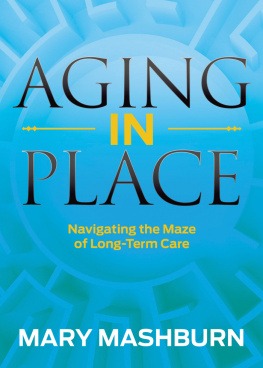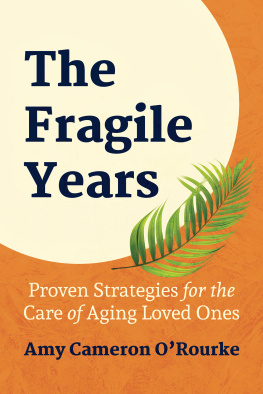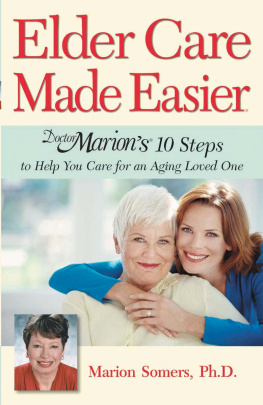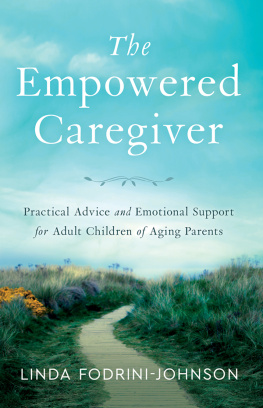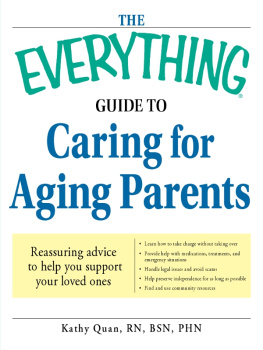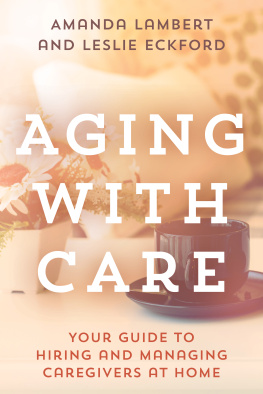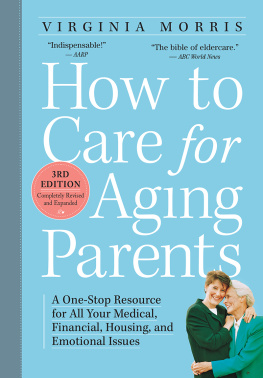Aging in Place
AGING
IN
PLACE
Navigating the Maze
of Long-Term Care
MARY MASHBURN

NEW YORK
LONDONNASHVILLEMELBOURNEVANCOUVER
Aging in Place
Navigating the Maze of Long-Term Care
2019 Mary Mashburn
All rights reserved. No portion of this book may be reproduced, stored in a retrieval system, or transmitted in any form or by any meanselectronic, mechanical, photocopy, recording, scanning, or otherexcept for brief quotations in critical reviews or articles, without the prior written permission of the publisher.
Published in New York, New York, by Morgan James Publishing in partnership with Difference Press. Morgan James is a trademark of Morgan James, LLC. www.MorganJamesPublishing.com
The Morgan James Speakers Group can bring authors to your live event. For more information or to book an event visit The Morgan James Speakers Group at www.TheMorganJamesSpeakersGroup.com.
ISBN 9781683509790 paperback
ISBN 9781683509806 eBook
Library of Congress Control Number: 2018934770
Cover and Interior Design by:
Chris Treccani
www.3dogcreative.net

In an effort to support local communities, raise awareness and funds, Morgan James Publishing donates a percentage of all book sales for the life of each book to Habitat for Humanity Peninsula and Greater Williamsburg.
Get involved today! Visit
www.MorganJamesBuilds.com
For Paul
The evil that men do lives after them;
The good is oft interred with their bones;
~ Julius Caesar (Act III, Scene 2)
Introduction
W hat motivated you to pick up this book and take a look at the inside?
Are you worried about your aging loved ones and what problems you may face in the future? Congratulations on your willingness to begin thinking about these issues and to look for solutions before a crisis happens. Many people bury their heads in the sand regarding these issues because it is easier to do that rather than engage in difficult conversations with loved ones. Lets face it. No one enjoys talking about what will happen when they are old and in failing health, let alone what their wishes for treatment and comfort would be if they are diagnosed to be in a terminal condition. If more people were willing to communicate with their loved ones concerning these issues and do appropriate planning before the zero hour, their relatives would not be left scratching their heads and wondering if the decisions they are looking at making are really what their loved ones would have wanted.
Maybe your family is already in crisis, with one or more older family members hospitalized, and many serious decisions regarding medical treatment and long-term care needing to be made immediately. Carving out some time from your crisis-and deadline-driven schedule to read this book will give you some important insights into the difficult and often frightening issues you and your family are facing and may even offer you some possible solutions that you have not considered.
In order to keep the language of this book as simple and direct as possible, I am going to refer to your aging loved one or relative as she or her (since, in many cases, that person really will be female) and designate her as your mother which is particularly appropriate since, in many cases, your mother is the last surviving parent. Indeed, many of you reading this book are at wits end trying to figure out exactly what topics you and your mother need to discuss; what decisions she, you, or both of you need to make; and where you both should look to find the extra support you need to carry out these decisions.
Discussing what your mothers wishes are if she is facing a life-threatening medical condition is just the first step. Figuring out what to do and what your mom wants should she become disabled either with physical problems or dementia or both is a bigger and usually more of a long-term problem. Open communication about these issues is never pleasant, but is absolutely necessary if you and your siblings are to discover your mothers wishes and provide the best care possible for her in accordance with those wishes.
You may feel that the prospect of you and your siblings opening up and discussing your thoughts and feelings concerning your mothers health and other topics discussed later in this book sounds much easier than attempting to discuss these issues with your mother and getting her to let down her guard and speak honestly concerning her wishes. Not only might she want to avoid talking about these difficult subjects altogether, she could very well think you dont know what you are talking about and cant understand what she is feeling. In addition, she may be very reluctant to discuss or allow you to help with financial matters because she absolutely does not think you are capable of understanding her financial situation. She may think that you dont have a head for business, or that you couldnt possibly understand the complex system of Medicare and her other health insurance. Often (especially if dementia is already setting in and she is showing the signs of paranoia that often accompany the disease), she may feel increasingly vulnerable and be reluctant to discuss financial matters with you or allow you to assist her because she fears that you may take advantage of her and cause her to lose some or all of her hard-earned money.
Frequently, although not always, one sibling (is that you?) steps up to the plate and tries to talk to a parent about these difficult issues and has some measure of success because of trust that has developed over the years. While that is great, other problems can develop when the jealousies and hurt feelings of other siblings surface. Again, if a family addresses these issues as a group while your mother is still in relatively good health and has a relatively clear mind, much can be resolved with clarity and without bitterness. This book will guide you through the process.
As I stated above, many older people find it much easier to avoid discussing these issues with their loved ones and to avoid taking action to sign documents giving authority for others to act in their stead (powers of attorney, living wills, advanced directives, etc.). You are facing both short-term and long-term issues that often require quick decisions and action, and your mother may or may not have signed any of the important documents that would allow you to act on her behalf. So, besides worrying about all of the above issues, if you discover that your mother is permanently impaired to the extent that she may not in the foreseeable future be able to make decisions or handle financial affairs, then you and your family will in all likelihood need to start a court proceeding to establish a guardianship or conservatorship (the name depends upon the laws of the state in which your loved one resides). In addition, if your mother will need long-term care (nursing home or assisted living) for more than just the very short period which Medicare covers and does not have sufficient cash resources, someone will need to begin the intense and degrading process of applying for Medicaid on her behalf in order to cover the expenses of care which typically will range from $5,000 to $15,000 per month, depending on her state of residence and the level of care she requires.
Ideally, whether you and your mother are attempting to plan for the future or you are in a crisis situation, you need to seek assistance from a variety of sources including an attorney, financial advisor, geriatric care manager, or social worker. I realize that in a true time crunch this is not always possible, but I cannot overemphasize the importance of getting good advice from a variety of professionals from several different disciplines in order that your mother and all members of your family will have the best insight possible into the various situations you are facing. Reading this book will give you insight into different issues you should consider and the questions you should ask in planning for the future with your mother as well as offering information and possible solutions if you and your family are currently facing the need to make important medical decisions for her.
Next page
